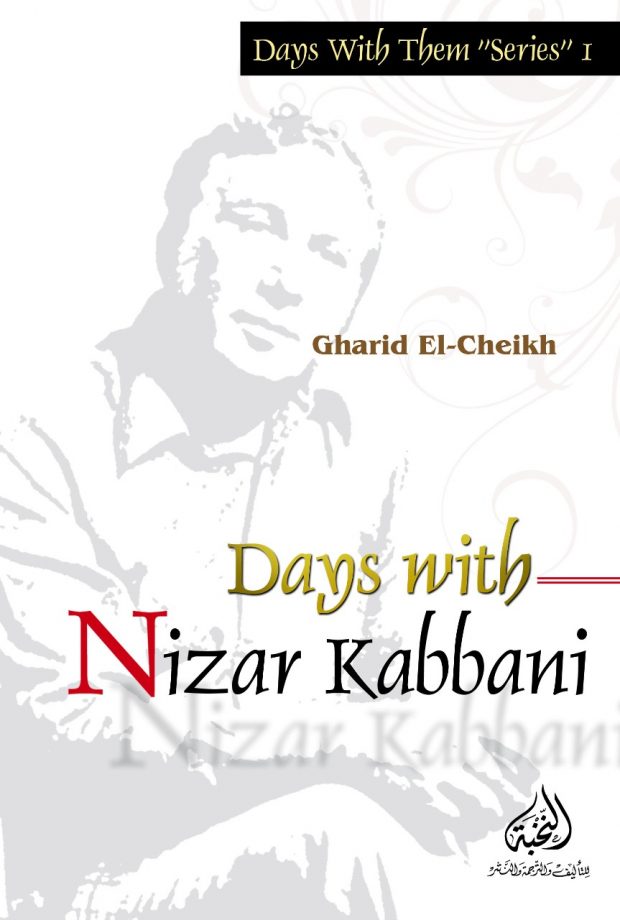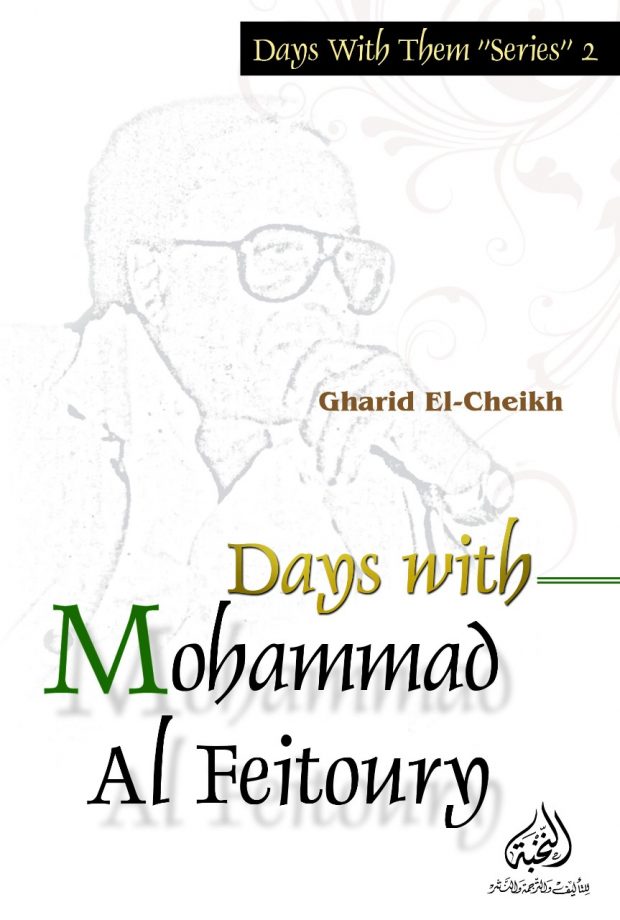
Gharid El Cheikh: Days with Them Series

By Ashraf Aboul-Yazid
President, Asia Journalists Association (AJA)
Days With Them Series is a collection of dramatic stories; each is about a poet with a modern style. The main character is a young woman who conjures up her heroes and has conversations with them. She sympathizes with her heroes and gets to know their life through events they narrate and poems they read.
CAIRO: In her book Days With Nizar Kabbani (The great Syrian poet ,1923-1997) author Gharid El Cheikh (writer, lexicographer, owner of Dar Al-Nakhba for authorship, translation and publishing, Beirut) created two characters; Maya, a young lady of about 30, is a brunette with long black hair, preparing for her PhD and studying collections of poems who writes stories about poets with whom she deals romantically and lovingly. The second character is Nabil – Maya’s fiancée, who is a young man of about 40 who works as an architect and cares for literature and poetry.
The author, creates a heroine “Maya”, who dreams about meeting the poet, going to his favorite places, and she starts her journey at home in Damascus. Maya walks through the narrow alleys of the Syrian capital. She gets to Al Bazourieh market, one of Damascus’ most impressive markets that touch both the nose and the soul at the same time. The aroma of the pepper, the cinnamon, the roses, the saffron and dozens of other colorful and aromatic herbs fill the air. She approaches one of the shops and buys a box of Damask delights that he likes and carries it with the fondness of a mother who’s getting her child a special gift.

She approaches the small wooden gate, and before she knocks it, it opens indicating that someone was awaiting her visit. A symphony of light, shadow and marble welcomes her.
Here’s the bitter orange tree embracing its fruits, just as he described it. And the grapevine is pregnant. The jasmine tree, however, has given birth to a thousand white moons and hung them on the window bars.
She approaches the pool made of black marble in the middle of the house. It was still filling its mouth with water and blowing it out. Red local roses, a lilac brushing her hair and a dozen Damask roses of different colors and smells surprise her in one corner or another.
Maya sits on a chair in the middle of the house and places her papers on the table. A few pigeons come down to the yard and wander about peacefully and serenely.
She hears him coughing softly from behind one of the doors, as if announcing his arrival.
Maya moves towards him: “Hello, Sir.”
Nizar: “Hello.”
Maya looks admiringly around her and says: “Finally I get to see the Damask house that I’ve always read about in your prose and poetry.”
He looks around him with absolute pleasure as he proudly says:
In Damascus I was born
Among the Arabian jasmine
Green geraniums
Daffodils
And azaleas
In my language there still is
Something of cinnamon, cumin and pepper
“Yes, it is within this green belt that I was born and I crawled and said my first words. Imagine that a man should run into beauty on a daily basis.
As a child, when I stumbled, I used to stumble into a pigeon’s wing, and if I fell, I would fall into the lap of a rose.”
She interrupted him: “The most beautiful of falls.”
He asks her suddenly: “Do you reckon there is a perfume in the whole world that is sweeter than our home’s?”
She nods her head in agreement as she inhales the aromatic smells that emanate of every corner. She looks at a fat cat stretching on one of the marble stairs and at the pigeons swaying fearlessly.

He says: “Everybody who lives in this house enjoys an absolute freedom; the pigeons migrate and return as they wish without being asked about what they’re doing, and the red fish swim freely without being questioned about their destination.”
She interrupts him: “And the tin of Arabian jasmine?”
He smiles and says: “Twenty tins of Arabian jasmine make my mother’s wealth. Every rose matches one of her children. As kids we were very naughty and we used to go behind her back and steal one of them, she would cry and complain about us to God. Can you imagine that?”
Maya: “It’s the whole world.”
Nizar: “Our home is my oasis. It’s the place where I spend my summers and winters. It’s my all-time friend.”
Maya: “The sunshade and moisture as you call it?”
Nizar: “Exactly. This house-umbrella has left its clear prints on my hair, just as Granada, Cordoba and Seville left their prints on the Andalusian poetry.”
Maya: “What about the outside world? How has it affected you?” Nizar: “To me home was the limit of the world. Our beautiful home preoccupied all my feelings and made me lose my appetite for the outside world.”
Maya: “So your home is the key to understanding your poetry.”
Nizar: “Yes, I learned the Damask language that pervades the joints of my words at my home-umbrella. My childhood was filled with moisture, my notebooks were filled with moisture, and my alphabet was filled with moisture.”
Maya: “Your poems are gardens of colors, fragrance and whispers.”
Nizar: “That is because thousands of Damask plants, those that you see in front of you, still climb my fingers every time I want to write. I’ve carried Damascus with me to all the hotels of the world that I entered and I slept with her on one bed.”
My place of birth is Damascus
Where houses are but naked women
On the white of her chest
Rivers live their adolescence,
It is a miracle to be born in a city
Which on one’s shoulders
In summer throws thousands of moons
Maya takes out the box of Damask delights and offers it to him: “I’m sorry. In the presence of the surrounding beauty I’ve forgotten to offer you this candy that you like.”
The book is 128 pages, published recently as a PDF edition, has an introduction written by critic and academic figure, Dr. Mohammed Zakaria Anani, Egypt, where we find a conclusion on the iconic poet:
“It may well be that Nizar Kabbani, just like Al Mutanabbi, will be the talk of the people through the generations, that he will continue to arouse storms of controversy and collect as many allies as enemies. It is, further, not true, and I can be quite sure, what one critic, Dr. Maher Shafik Farid, claimed in the Literary page in the Evening Newspaper, which is supervised by Mr. Mohammed Jibril that Nizar is one big lie, since he, as Dr. Farid claimed, has written one or two poems. Two poems, at the most? What would you make, then, of this great number of masterpieces that this nice young, somewhat trouble- making lady has made us hear? She has invaded Nizar’s intimate world, roaming in the roads of his creativity and his rounds to bring with this flow of luxury and tenderness. She was able with her intelligence to extract the sweetest, brightest, and most artistic pearls of Nizar.
It is of utmost importance that we prepare ourselves in advance to understand the ambience that Maya’s, or rather Gharid El cheikh, reader will direct himself into. It is undoubtedly far from being academic or epistemological, and it doesn’t fall under any of those complex terms and the obscure dark passageways since the primary direction of the author is to draw for the common reader the features of the art and the personality. Being aware of what she wants, she has borrowed a narrative framework combined with a simple, original, loving style that she brushed with a warm smart sense of reality. She has already tried this style in an agreeable, fine book on Jarir and was quite successful at it, so why not use the same approach with Nizar Kabbani, and even others as well?

What I would like to draw attention to is the idea that the simple style that overwhelms the book is actually elusive; it is really simple in its topic, authorship and general approach. However, it is clear that it is the simplicity that is based on extensive reading and intelligent awareness of Nizar and his poetry.
It is the simplicity of the rose that emerges to the world like that: spontaneous, fresh and unpretentious. Its aroma sneaks into the soul and dwells at the bottom of the heart. This is how Gharid Al Sheik’s book comes as a beautiful piece of music that carries the romance of the dream and the flavor of the reality that the poetry and life of Nizar Kabbani has.”
A copy of the book in English is available for reading via:


